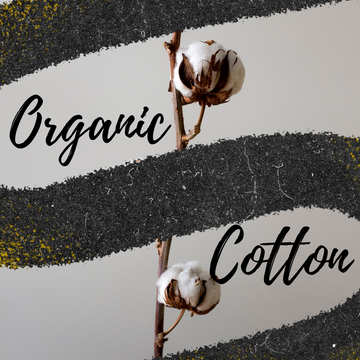You might not be surprised to see the popularity of organic cotton in today's era. With fast fashion, sustainable fabrics have come a very long way. But again, the question arises, is organic cotton fabric a better choice than cotton products that do not carry the organic label? Is it better for the environment and your skin? As a biodegradable natural material, conventional cotton is undoubtedly more eco-friendly than synthetic fiber, but organic cotton takes sustainability further. Organically grown and processed cotton cuts down on landfill waste and decreases pollution.
However, cotton is the most widely grown and manufactured product on earth. According to Statista, 123.7 million 480-pound bales of cotton were produced globally in 2008 alone. Moreover, it has been studied that conventional cotton is responsible for a crowd of adverse environmental impacts, which includes soil degradation, pollution with the use of pesticides and chemicals, and water consumption. In short, conventional cotton is harmful not only to the environment but also to the quality of life of local communities. Here, in this guide, we will discuss sustainable cotton and its benefits to society and the planet.
What is organic cotton?
Organic cotton is grown without toxic pesticides, fertilizers, or synthetic chemicals. The seeds used to produce the organic cotton are non-genetically modified, unlike conventional cotton. Organic cotton farmers use less harmful farming practices that help the natural environment by prioritizing soil fertility and diversifying the climate where cotton is grown.
By law, organic cotton plants cannot come from genetically engineered seeds, and strict regulations explain how cotton must be grown. The Federal Trade Commission (FTC) and the US Department of Agriculture oversee organic certification in the United States. However, Oeko-Tex Standard 100 and the Global Organic Textile Standard (GOTS) are significant certifications. However, the other third-party certifications cover turning organic fiber into organic textiles.
However, the label "organic" may not take things far enough. But when products are marketed as organic cotton fabric, that only refers to how the cotton was grown. Your product can still be treated with harmful chemicals like bleached and dyed toxic inks that contain heavy metals, which is why checking for Oeko-Tex and GOTS certification becomes necessary. Moreover, these two significant certifications will clear your mind if you wonder if organic cotton is sustainable or not.
What are GOTS-certified organic cotton products?
The GOTS was developed to prevent manufacturers from labeling products as "organic" without oversight. GOTS-certified organic cotton products have been grown, processed, and manufactured following international standards crafted to protect the environment and workers. Moreover, to qualify as a product made with GOTS-certified organic cotton, the complete production process must be free from harmful chemicals, from growing to harvesting to manufacturing.
In addition, purchasing GOTS-certified products protects the labor forces and environment connected to every element of the cotton manufacturing process. The certificate also ensures that consumers feel confident about their organic cotton purchases' ethical implications and sustainability.
What is Oeko-Tex-certified organic cotton?
The certificate is tested for harmful chemicals upon completion of the manufacturing process. Oeko-Tex is an organization working in over 40 countries worldwide to ensure that organic textile remains free from a long list of hazardous chemicals.
The organization helps manufacturers and consumers know that their products are manufactured as advertised. They even offer a label-checking app so that customers can feel confident that the products are authentic and made under sustainable and socially responsible conditions. In addition, companies like Oeko-Tex make it easier to be a privileged consumer and support only beneficial, responsible businesses with your purchases.
How is organic cotton manufactured?
Organic cotton is manufactured with strict farming and production practices. However, it can take three years for a conventional cotton farm to start becoming certified organic. However, for organic cotton to be certified, it must be grown and manufactured with naturally-driven pesticides and fertilizers and not treated with synthetic chemicals.
After that, the processing and manufacturing must ensure no contamination with non-organic fibers, along with a strict policy on the types of bleaches and other materials that the fibers are treated with. This extends to the materials used to develop cotton products. But environmental standards must also be met, including packaging materials, waste minimization goals and procedures, and wastewater treatment.
However, GOTS also specifies some strict social standards to be met to ensure no human rights are being violated.

The employment of all the people involved in the cotton production process is chosen freely, all the appropriate conditions are met, and living wages are paid.
The Benefits of Organic Cotton:
Cotton vs. Organic cotton benefits the environment, local communities, and the end consumer. Learning these benefits can help you to make a reliable choice when purchasing products made from cotton. Below we will discuss some of the key benefits of organic cotton.
Environmental Benefits:
1. As organic cotton is grown without synthetic chemicals, it reduces the use of dangerous pesticides and fertilizers. This means soil, air, and water are not prone to harmful substances.
2. Organic farmers focus on soil health and fertility and improve biodiversity through their farming practice.
3. Organic cotton farming also prioritizes managing water sustainably, which means the average organic T-shirt can save thousands of gallons of water if we compare it to conventional t-shirts.
4. Although all cotton is biodegradable, it will break down in landfills. But conventional cotton contains synthetic chemicals that harm the natural environment, unlike organic cotton.
Social Benefits:
If we talk about alternatives to cotton, then Non-organic cotton has a harmful effect on the environment and on the farmers and manufacturers of the cotton fibers. The organic cotton process ensures that the people making the products are adequately treated and benefit from producing the cotton fiber and fabric.
1. Organic cotton farming uses nonsynthetic pesticides or harmful chemicals, so the farmers who grow the product are not exposed to these life-threatening substances.
2. The Textile Exchange has found that around 97 percent of organic cotton producers encourage participation by women, while about 84 percent have described benefits to communities from organic cotton production.
3. Moreover, organic cotton has the added benefit of improving the economic return for farmers. Is organic cotton better? Then it would help if you remembered that the farmers use resources for input that they can get locally, which means costs are lower, and they get a higher financial return.
Final Thoughts:
People nowadays are more conscious about what they eat, wear, and, of course, what human actions are harming their planet. They have found the best solution to save the environment: sustainable living. These days brands and businesses are also moving towards eco-friendly manufacturing products. In the above blog, we have covered a significant discussion under the organic cotton fabric that includes its meaning and benefits and explains why organic cotton is sustainable.
Also Read some amazing information about Is Slow Fashion Movement Is Same As Sustainable Fashion







